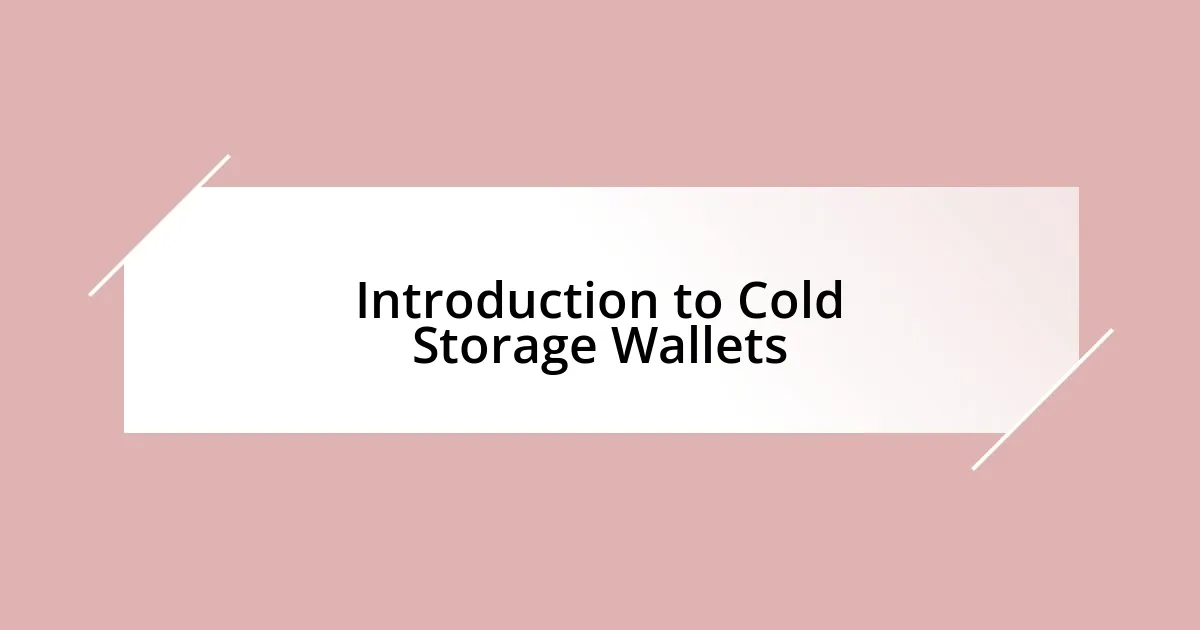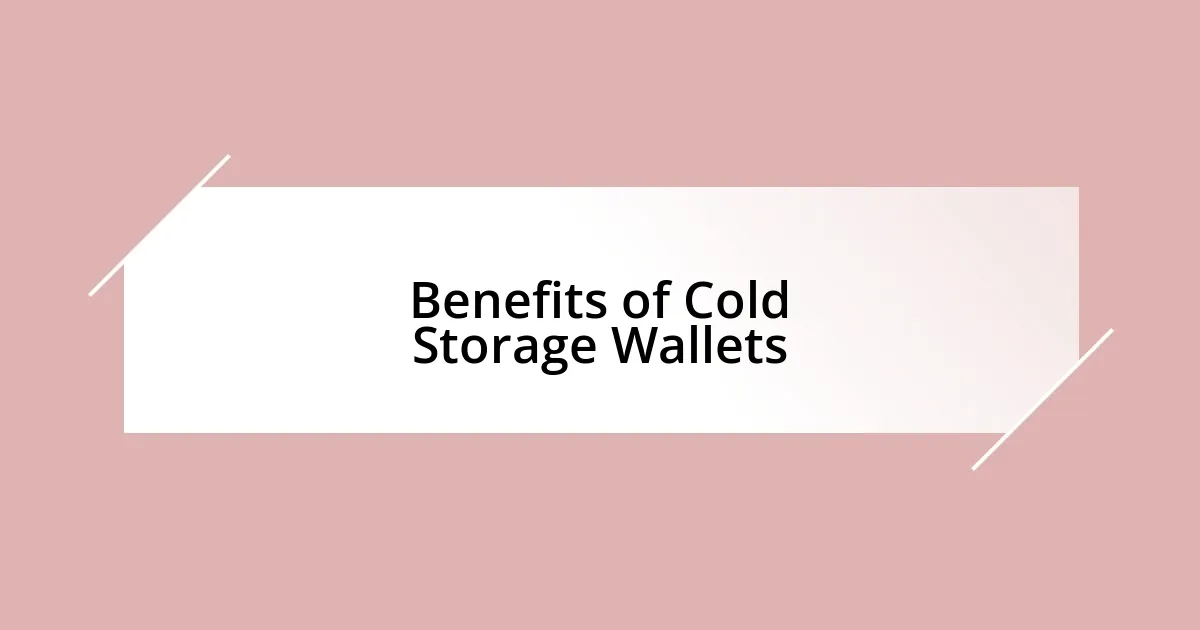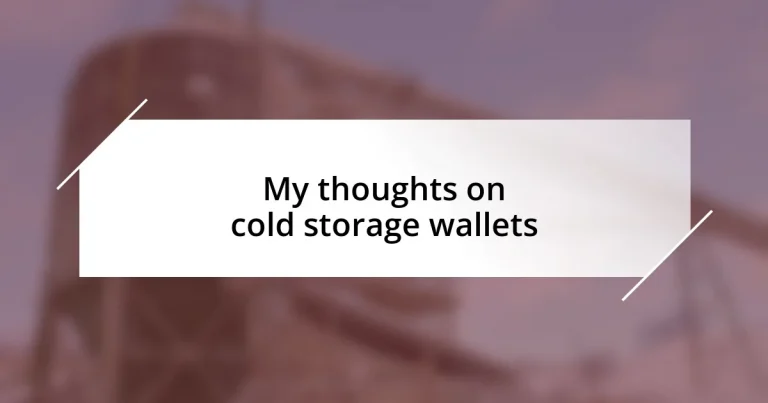Key takeaways:
- Cold storage wallets provide enhanced security by keeping assets offline, minimizing vulnerability to hacks and malware.
- Users have complete ownership and control over their private keys, eliminating dependence on third-party services.
- Cold wallets are ideal for long-term storage, allowing for potential growth without the stress of frequent trading.
- Utilizing a cold storage wallet fosters a responsible and thoughtful approach to managing cryptocurrency investments.

Introduction to Cold Storage Wallets
When it comes to safeguarding your digital assets, cold storage wallets stand out as a priority for anyone serious about cryptocurrency. I remember my first encounter with cold storage—it felt like finding a hidden treasure chest for my Bitcoin. The contrast between hot wallets, which are connected to the internet, and cold storage, which keeps your assets offline, is significant. Isn’t it fascinating how one simple change in storage method can provide such peace of mind?
Cold storage wallets come in several forms, like hardware wallets or even paper wallets, allowing you to have tangible control over your cryptocurrencies. This hands-on approach elicits a sense of security that I didn’t realize I craved until I experienced the immediacy of having my keys right in front of me. Have you ever considered how much trust we put into online services? It’s a bit unsettling, isn’t it?
For me, using a cold storage wallet also became a lesson in responsibility; it’s not just about having a wallet, but about taking deliberate steps to protect my financial future. Each withdrawal or transfer becomes a calculated decision, underlining the importance of being responsible with my assets. Does owning a cold storage wallet evoke a sense of empowerment for you as it does for me? It’s an essential step toward true ownership in the fast-paced world of cryptocurrency.

Understanding Wallet Types
When diving into wallet types, it’s essential to understand the two main categories: hot wallets and cold wallets. Hot wallets, often used for day-to-day transactions, are those that remain connected to the internet. I remember using one for trading—it was convenient, but each ping of my phone made my stomach churn a bit, knowing that I was more exposed to potential hacks. Cold wallets, on the other hand, are like that extra security measure you take when you lock up your valuables; they’re offline, making them much less vulnerable to cyber threats.
In my experience, the choice between these wallets often comes down to how you plan to use your crypto. If you’re actively trading, a hot wallet might be your go-to for quick access, but for long-term investors, a cold wallet offers significantly better security. I recall stashing away a portion of my crypto in a hardware wallet—it felt like tucking away cash in a safe. The peace of mind that followed was tangible; I couldn’t help but grin, knowing those assets were secure and out of reach from hackers.
To summarize this comparison effectively, here’s a quick look at the key differences between wallet types:
| Wallet Type | Security | Accessibility | Best For |
|---|---|---|---|
| Hot Wallet | Lower | High | Active Traders |
| Cold Wallet | Higher | Lower | Long-term Investors |

Benefits of Cold Storage Wallets
When I think about the benefits of cold storage wallets, security is the first thing that stands out. Knowing that my cryptocurrencies are kept offline gives me a deep sense of relief. I remember the first time I transferred my assets into a cold wallet. It felt like locking my prized possessions in a vault, far away from potential digital thieves. There’s something undeniably comforting about having that layer of protection.
Here are some key benefits to consider:
- Enhanced Security: Cold storage wallets are not connected to the internet, meaning they’re less susceptible to hacks and malware.
- Ownership Control: You have complete control over your private keys, eliminating reliance on third-party services.
- Long-Term Storage: Perfect for holding assets you don’t plan to trade frequently, allowing for potential growth without daily worries.
- Backup Options: Many cold wallets allow you to create physical backups, securing your investments even further against loss or theft.
I can’t help but appreciate how this investment in security fosters mindfulness about my cryptocurrency journey. Every time I check my assets, I’m reminded of the deliberate choice I made to prioritize safety over convenience. It’s a powerful feeling, transforming the way I interact with my digital wealth.

Conclusion and Final Thoughts
When reflecting on cold storage wallets, I can’t help but think about the peace of mind they provide. The idea of knowing my investment is secure, tucked away safely, brings a sense of calm, especially in a landscape fraught with uncertainty. Have you ever felt that sigh of relief when you finally secure something valuable? That’s how I feel every time I trust my assets to a cold wallet.
It’s interesting how our mindset shifts once we adopt a more secure method of storing our cryptocurrencies. I remember the first time I accessed my cold wallet after a few months; instead of anxiety about market fluctuations, there was this wave of confidence and assurance. My focus shifted from short-term gains to a more thoughtful, long-term strategy. Isn’t it fascinating how a small change in how we store our assets can completely transform our approach to investing?
While the convenience of hot wallets is tempting, I urge you to think about what truly matters to you in your crypto journey. If security is at the forefront, then committing to a cold wallet might just be the best decision you make. Trust me, that feeling of safeguarding your digital treasures outweighs any fleeting moment of instant access.














